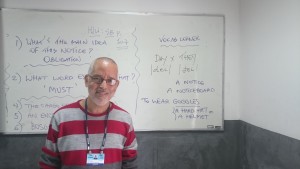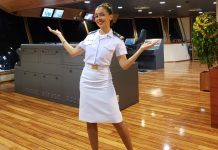
O Jornal Pelicano segue com sua série de entrevistas e dessa vez temos como nosso escopo ouvir o relato do professor de inglês Mario Farzatt. Diferente dos outros entrevistados, Mario não seguiu uma carreira como oficial da Marinha Mercante, sempre trabalhou em sala, ajudando os mais diversos alunos a melhorar um dos fatores mais exigidos no mercado de trabalho dos tempos atuais: a língua inglesa. Seu destaque dá-se exatamente por isso.
É consenso entre os alunos da Escola de Formação de Oficiais da Marinha Mercante (EFOMM), que Mario não somente é um dos melhores que temos a disposição, como também está entre os melhores que os alunos já tiveram. Por isso, depois de um ano sob sua avaliação, a oportunidade de aplicar um “oral test” no próprio professor não podia passar.
Confira a tradução em português da entrevista, na próxima página.
JORNAL PELICANO – First of all thank you for accepting our invitation.
PROFESSOR MARIO – Thanks for having me.
JORNAL PELICANO – Why have you become an English teacher?
[quote_center]I fell in love with the language and later on, I discovered I loved teaching[/quote_center]
PROFESSOR MARIO – I decided to become a teacher when I was 16; I was finishing my English studies. I find it very easy to learn languages in general. Not only me but a lot of people have that talent. I fell in love with the language. I wanted to know more and later on, I discovered I loved teaching. I started giving private classes to friends because I needed to make some money, too. I finished my course back at Cultura Inglesa in 1977, went to college in 1978, and they called me back to be a teacher at Cultura in 1979. And I´ve been working there ever since. I´ve already worked at Brasas and IBEU as well. Here at EFOMM I am not quite sure how long I´ve been working, but more than 10 definitely.
JORNAL PELICANO – What do you think a qualified and good Merchant officer should have?
[quote_right]Most people want the job because of the money, but that’s not all of it[/quote_right]
PROFESSOR MARIO – I think you have to want to become an officer. Most people want the job because of the money, I think that´s OK, if that´s what you want, but that´s not all of it. You have to be psychologically ready for it, also emotionally intelligent as well. Some people have the knowledge to carry out what they are supposed to do but there are so many things to deal with that if they can´t handle it, they might end up suffering a lot. It´s not very easy to lead a military type of life. You have to be adaptable, the friendlier you are as a person, the easier it is for you. Living in a confined type of life, even though you are not alone is not easy. I think this school prepares you very well for those situations, because you are always dealing with difficult things from the very beginning.
JORNAL PELICANO – And how about his or her English skills?
[quote_center]What the job market expects you to speak is upper intermediate level, that’s what we CIAGA teachers expect you students to achieve[/quote_center]
PROFESSOR MARIO – What the job market expects you to speak is upper intermediate level, which is about the average level in Europe. With this English you can more than survive, maybe having some problems dealing with more complex situations, but that´s what we CIAGA teachers expect you students to achieve. Here in Brazil I would say, based on some recently released studies, most people speak at lower intermediate level.
JORNAL PELICANO – Based on your experience here at CIAGA, what can a person with your skills and knowledge do for a student willing to follow the path of a merchant officer? What can you do to improve his English?
[quote_left]We are able to send you better prepared for the second and then third year[/quote_left]
PROFESSOR MARIO – When I first started here, students were divided by their level of performance. Basic, intermediate and advanced groups. And that was great; we had groups that initially had difficulty in terms of communication and at the end were at a much higher level. Today it´s harder because we have very different students in terms of performance in the same classroom. But when we start the course here, I always pair up students with a classmate who can help them out and consequently me as well. That has always worked out. In addition, the books that we use now are much better because they´re maritime focused. We are able to send you better prepared for the second and then third year.
JORNAL PELICANO – How about the English teachers that were merchant officers before coming back to CIAGA?
PROFESSOR MARIO – I´ve always been very appreciative of our relationship, because the knowledge that they have acquired on board along the years is vital and almost exclusive. It´s a very different world. And when we come to them, they help us a lot. They are very kind. I know the language; I know the technical terms but I don´t have the hands-on experience that they do and no one but them have that, because they are the seafarers. Sometimes you students end up knowing even more than us later on due to the experience you gain on board.
Mario diz que é um esforço conjunto. Um aluno que não conseguia formar frases no começo, desenvolver em pouco tempo uma maior fluência não é magica. Receber 2,4 de 4,0 na primeira avaliação oral e dois meses depois alcançar a nota de 3,2 requer dedicação. “50% do aluno e 50% do professor. Essa melhora vem do esforço que fazemos em sala de aula, mas principalmente do individual”. É bom para os alunos poder contar com um professor dedicado de uma vasta experiência e qualidade de ensino em uma matéria tão exigida nas nossas carreiras.





